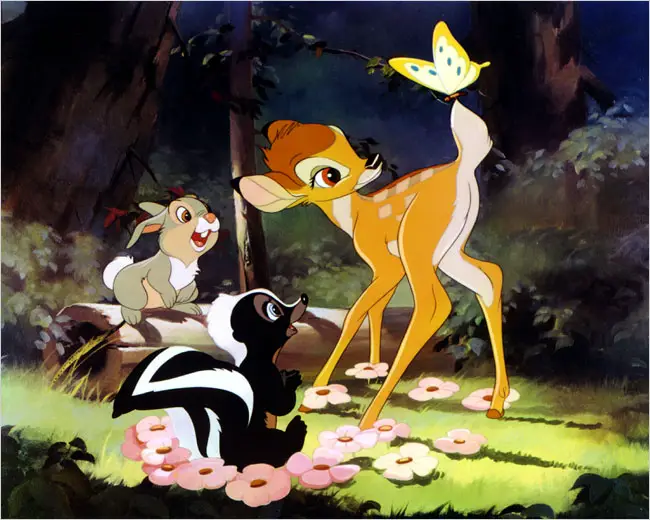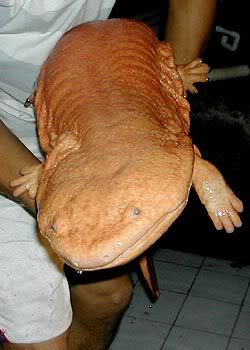


The True Story of Bambi and Anti-hunting Morality

People are funny. Strangely, even hunters sometimes attack other hunters simply because they don't hunt they way they do. It is a dilemma, not based on knowledge and reason, but ignorance fed by emotion. Ever wonder where Bambi came from? Walt Disney wanted Bambi to be true to life. So, Disney had a pair of fawns shipped in from Maine. He instructed his artists to watch carefully as an anatomist dissected the decaying carcass of a newborn deer. The drawing originally produced by the Disney animators were lifelike, but found to be not nearly cute enough to pull at the heart-strings of the public.
As a result, the Disney artists were told to make Bambi cute, far cuter than life. It is, by now, the standard process of making the head bigger and adding abnormally large eyes. Bambi's muzzle was also shortened. This is a the babyfication process, covered by Hal Herzog in his fabulously thought-provoking book, Some We Love, Some We Hate, Some We Eat. Humans are easily manipulated by notions of cuteness.
The public's view of a baby deer is irrational. According to the Insurance Information Institute (I.I.I.) there are more than 1.6 million deer-vehicle collisions each year resulting in about 200 fatalities, tens of thousands of injuries and over $3.6 billion in vehicle damage. An additional $1 billion is spent on medical payments for injuries to people in the car and out-of-pocket expenses paid by vehicle owners, bringing the total cost to approximately $4.6 billion. Still, that doesn't give the complete picture. We have significant crop depredation on top of that.
Unless you think that food is just too darn cheap and you pay too little for automobile insurance, the view of deer hunting is a very long ways away from Bambi. Hunters and shooters do foot the bills more than anyone. It has been that way, in the U.S., since February 25, 1919, when the FAET was introduced. It is hunters that buy the tags, spend the cash, fund the DNRs, power the entire industry.
Yet, some people don't “get” hunting. Even hunters don't get hunting, particularly high-volume hunts and so forth. Do we think we understand the pet cat? A cat kills for fun. Unlike other animals, such as snakes, a cat is a recreational killer. Some 94 million cats in the U.S, killing an estimated one billion small animals every year. Hal Herzog points up that at two ounces of meat per day, cats eat the equivalent of 3 million chickens every single day in the United States. That's about 12 million pounds of flesh every single day. Are we still complaining about food prices or trying to protect songbirds? Cats don't buy hunting licenses, fund DNR's, and they are notorious poachers. That's part of the moral dilemma. We just can't seem to figure it out. Cats kill a billion small animals every year, but some cat owners are anti legal hunting. It boggles the mind. We kill a couple of million cats every year ourselves, in animal shelters. The bodies, mostly kittens, are then cremated. Yet, despite this, we object to the use of cats for biological experiments to combat disease.
The history of animal protection is a contradictory and puzzling one. Consider the “1933 Law on Animal Protection,” the most comprehensive set of animal protection laws in Europe. It was enacted in Berlin, November 24, 1933, signed by Adolf Hitler. Post-war Belgian SS General, and friend of Hitler's, Léon Degrelle wrote: "He could not bear to eat meat, because it meant the death of a living creature. He refused to have so much as a rabbit or a trout sacrificed to provide his food." So much for the cuddly side of Hitler.

Above: the critically endangered, practically blind Chinese Giant Salamander: no cuteness, no love.
It is a work in progress, with more emotion than intellect involved in stances. Mickey Mouse, actually a sleazy, somewhat creepy character originally (Steamboat Willie) was given the cute treatment. While saving animals from extinction sounds good, only the cute animals get the funding-- like the Giant Panda. With a large head, small eyes and dark and wrinkly skin, the critically endangered Chinese giant salamander gets no such love.
The more we are removed from wild animals, the less we understand them. The same applies to our morals towards humans. The speeding tram with failed brakes is headed towards eight people. If we throw a switch, we can cause it to change tracks where it would kill only one person. Would we do it? Most would, as saving seven lives in exchange for one is morally acceptable. Hal Herzog covers this a few ways, in his book. But, what if we had to throw a fat guy into the path of the speeding tram, knowing that it would save eight lives, would we do it? The moral question is identical, trading one life for eight. Yet, throwing a switch is far more palatable than throwing the fat guy into the path of the tram. Baby mice are extremely cute. Despite their cuteness, how many baby mice would we kill to find a cure for cancer? Rabbits? Chimps? Or the ugly Chinese salamander, spiraling towards extinction?
Hunters support healthy game populations more than any other group. Game populations desperately need to be managed. Who wants to pick up that $4.6 billion deer-vehicle collision bill? Who wants to accept responsibility for the tens of thousands of human injuries and the couple of hundred human fatalities? Apparently, no one.
We are easily influenced by hyperbole. Rather than neutral terms like harvest or manage, it is easy to throw out terms like slaughter. News flash: hunters don't gas or electrocute their game, nor do they condemn their animals to die from overheating in semi-trailers. Hunters revere and respect their game, spending great time, effort, and small fortunes to persue it, wasting nothing in the process. The same can not be said for all show dogs, circuses, pet shelters, zoos, horseracing, and many other areas. Rather than hunters attacking hunters, or anyone attacking hunters, we might want put more thought into our convoluted and contradictory relationships with animals. If we do, we will quickly find that hunting is a noble sport to take pride in. From a practical standpoint, it is hugely in the public interest.
Deer hunting is one of the best ways to save vegetarians' lives and protect them from injury. It is a good way to lower the cost of vegetarian auto insurance and health isurance. It also lowers the cost of grain, something the vegetarian needs to survive. For the love of God , the good of mankind, and the love of Country, please shoot deer . . . and save the poor vegetarian from himself.
Copyright 2012 by Randy Wakeman. All Rights Reserved.

Custom Search

